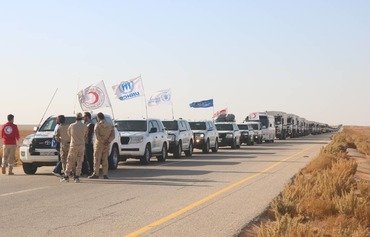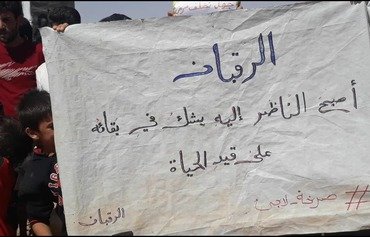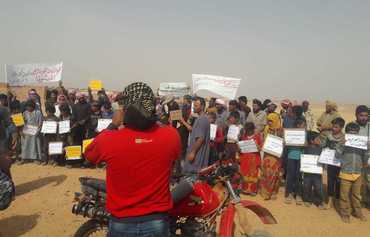A convoy of UN aid, the first in a number of months, was on Wednesday (February 6th) heading for al-Rukban refugee camp on the Syria-Jordan border.
Residents of the desert camp are living under very difficult conditions, with the lack of health care and basic food items leading to the spread of illnesses and the death of a number of children from the cold and malnutrition.
In mid-January, the UN said that freezing temperatures and the lack of medical care had killed eight Syrian children in the camp, AFP reported.
"Freezing temperatures and harsh living conditions in al-Rukban... are increasingly putting children's lives at risk," UNICEF regional director Geert Cappelaere said at the time.
![Snow blankets refugee tents in al-Rukban camp, exacerbating the hardships Syrian refugees are facing. [Photo courtesy of Tariq al-Nuaimi]](/cnmi_di/images/2019/02/06/16582-Rukban-camp-snow-600_384.jpg)
Snow blankets refugee tents in al-Rukban camp, exacerbating the hardships Syrian refugees are facing. [Photo courtesy of Tariq al-Nuaimi]
"In just one month, at least eight children -- most of them under four months and the youngest only one hour old -- have died," he said.
Cappelaere explained that the cold in the isolated desert camp, where 80% of the 45,000 residents are women and children, was increasing infant mortality.
Around 100 trucks laden with humanitarian aid and accompanied by a medical convoy were on Wednesday in the vicinity of al-Rukban camp, al-Rukban relief worker Tariq al-Nuaimi told Diyaruna.
It is about three months since the last aid convoy entered the camp, he said.
Convoy subjected to delays
The UN convoy was scheduled to arrive earlier, al-Nuaimi said, but was delayed because the various warring sides could not agree on the timing or the route.
The convoy was supposed to begin its journey in Syrian regime-controlled areas, then enter the area controlled by Jaish Maghaweer al-Thawra, he said.
Jaish Maghaweer al-Thawra fighters were to provide full security for the convoy as it traveled through the desert, and to secure the aid distribution process.
They also were called on to protect the accompanying convoy of close to 250 UN and Syrian Red Crescent medical staff members, al-Nuaimi said.
The distribution of aid will begin Wednesday and continue for three days.
Refugees from Bani Khalid and Mheen will be the first group to receive aid, he said, followed by the group from Tadmur (Palmyra) and the al-Umour and al-Qaryatain group.
"The distribution process has been divided into three phases to avoid chaos and disruption of the distribution process," al-Nuaimi said.
Vaccination of camp's children
The convoy will remain in the camp for an entire week to complete the vaccination of children, and its stay could be extended for a day or more to await the arrival of more vaccines, al-Nuaimi said.
The goal is to vaccinate the largest number of children possible, he said.
The food baskets to be distributed contain rice, flour, sugar and canned vegetables, he said, while other baskets contain personal hygiene items.
"The camp’s residents are in dire need of this aid," al-Nuaimi said.
The aid does not include heating material to help camp residents cope with the extreme cold weather, however, he said, noting that there have been several fatalities in the past months due to the cold and to malnutrition.

![UN and Syrian Red Crescent staff take part in a previous aid distribution operation at al-Rukban camp. [Photo courtesy of Tariq al-Nuaimi]](/cnmi_di/images/2019/02/06/16581-Rukban-aid-distribution-600_384.jpg)






